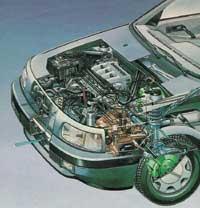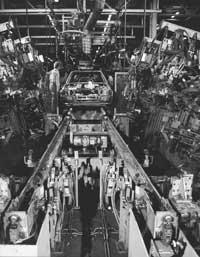The future of automotive component suppliers: The Car Built by Modules

This approach consists in the manufacture of cars with the minimum number of modules or parts of possible suppliers. Complexity, i.e. cost and flexibility, must be assumed by the supplier. The supplier component that competed in the system prior to costs and deadlines will become this time supplier of modules or integrated systems. Consequently, the car that the customer has requested “custom” a few weeks before will be mounted in a space of 4 hours. The supplier responsible for the location of the modules at the plant of the car manufacturer is responsible for this.
The fact that the parts go from being thousands in the integration of current cars to being a dozen modules that must meet in the future in the final phase will not be a superficial change. Radically changing the concepts of product technology and quality, flexibility, response time, productive structure and product strategy, in depth we are facing the birth of a new business approach.
What is the “Modular Car”?
With the decline in car sales, major car manufacturers have radically changed their relationships with suppliers, who now "unite" with a few. Selected suppliers must demonstrate, in addition to quality, price and services, R&D capacity, financial balance, geographic expansion and module supply capacity. In addition, suppliers will manage increasingly complex modules that will allow continuous cost reduction. This will allow car manufacturers to enjoy the entire service.

The proposed cost reduction measures, the material management of its modules, the product quality and the success of suppliers with design and development capacity. These main suppliers will become partners of the car manufacturer with whom they will negotiate all points related to the competitiveness of the product, from the price to the design of its components. With these measures, General Motors and Wolkswagen have managed to save more than half a billion pesetas, which ensures the interest of large companies.
In short, the “The Modular Car” approach defines a new relationship framework between the manufacturer and the supplier. This new relationship framework encompasses four extraordinary areas that must be contemplated simultaneously:
- Integration: a combination of all module components is required before access to assembly. In addition to the integration of the parts, the concepts of dimensional control and quality must be considered at this stage.
- Operations: during the assembly line, in the internal logistics of the module, in the computer interfaces and in the installation of the module, deep relationships between manufacturer and supplier must be achieved within a “Just in Time” scheme.
- Technology: integration of R&D in the design and development of progressive prototypes and concepts.
- After-sales: supplier involvement in after-sales responsibilities, guarantees, reliability, etc.
Current situation

The intentions expressed so far have not been fully extended in practice and car manufacturers have many of their future modules in “project”. In the modules that have served as an example (admin panel, central console, doors, seats, etc.) Although it must be recognized that they have demonstrated deep integration, there are many others that have developed little and that are the ones that remain ahead, especially the distribution of tasks and responsibilities.
One study has found that design/engineering decisions, component selection, quality-related actions, etc. are in the hands of car manufacturers (and in the near future they will continue to do so), as they are not willing to delegate control of the value chain. In internal logistics, however, there are already many suppliers that are fully carrying out their function.
On the other hand, when it comes to R&D, the design and development in most cases by the manufacturers passes to the suppliers in the form of specifications, maintaining the usual operation of work. On other occasions this process is done together, but the main control is always in the hands of the manufacturer. This is due to the low degree of integration of design and development, the limitation of suppliers' R&D resources and the strong momentum of manufacturers' engineering departments.
Supplier approval falls on car manufacturers. Although the module supplier proposes secondary suppliers, the manufacturer wants to continue to maintain control in the selection, in this way, with its purchasing power, it wants to avoid the supply of low-quality products through the “zero defects” program. The internal logistics is the most advanced, currently the main suppliers control 100%, so the modules are carried in the necessary sequence to the assembly line.
Next future
It is clear that in the future, manufacturers will integrate their suppliers into all development processes. This will reduce development times and therefore reduce costs, take advantage of supplier knowledge. They will apply a tight control of expenditure, in the first development steps, in which 75% of costs are established.

On the other hand, although car manufacturers are willing to take responsibility for the selection of secondary suppliers to the supply modules, it does not seem to be short-term, as they do not trust for the moment. Manufacturers do not want to lose the ability to be the main buyer and purchases will be made themselves. In addition, since quality is an absolute priority, liability is not expected to pass into the hands of suppliers. The same applies to warranty and after-sales services.
Although each car manufacturer has its own way of applying the “Modular Car” approach, most of them have shown their intention to work in this regard, the dissemination of these ideas is limited by the following variables:
- The flexibility of short-term manufacturers will be reduced by the expensive manufacturing facilities of the newly executed modules.
- The strength of R&D departments in the internal structure of car manufacturers will not make it easier for them to delegate design and development functions to suppliers.
- That there are still few companies that can be real suppliers of systems.
- Technical aspects such as the design of engines that prevent the loss of competence by manufacturers.
- That some modules are very variable and that each change has a reduced number.
- That certain modules by their load and/or volume are not suitable for transport.
Therefore, the future of the approach “The Car Made by Modules” is not clear, you can advance in the search of the most suitable point in the path of its application. However, from that moment on it seems to me that the advantages of this system do not compensate for the drawbacks.





